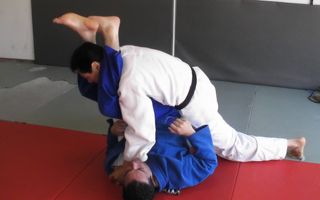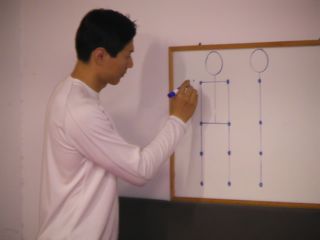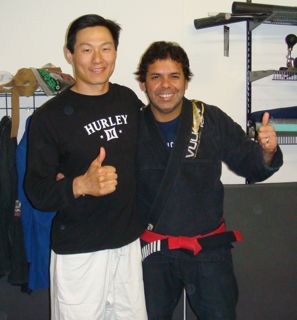Stephan’s Note: Michael Jen is a BJJ Black Belt based in Northern California. He’s contributed a LOT to the art via his videos, seminars and forum posts, so I was glad to get his input on improving your BJJ skills (and it turns out that it’s all YOUR responsibility).
 Q: What, in your opinion, is the most important quality to have in order to be successful in BJJ?
Q: What, in your opinion, is the most important quality to have in order to be successful in BJJ?
In the past, I said that it was having consistency, however, I now feel that the most important quality to be successful is self-responsibility. Plus, training consistently is ultimately a part of being self-responsible for one’s progress anyway. This self-responsibility applies to everything from learning techniques, to understanding how and when those techniques work, to practicing. To quote the Terminator movie, “There is no fate but what we make for ourselves.” 
Q: But aren’t there factors, such as the instructor, which play a factor in a person’s success which are beyond an individual’s ability to control?
Having a good or bad instructor does make a difference, however, self-responsibility is still the key. For example, if the instructor explains something in a way that you do not understand, it is your responsibility to ask him to clarify so you can understand. If the instructor is not teaching you in a manner you feel is to your best benefit, it is your responsibility to either ask him to change his approach or find another instructor if he doesn’t.
Q: What tips do you have for beginners when it comes to improving the weak areas of their game?
Work the things you hate at least twice as much as the things you like to work on. Work on those things you hate to the point that you begin to love to do it. Once this happens, what you once considered weakness will have become strengths.
One other thing I would say is to remember that no matter who you are and what your skill level is, never believe that what you are doing at the moment cannot be improved.
 Q: What advice do you have for BJJ practitioners when it comes to avoiding chronic pains?
Q: What advice do you have for BJJ practitioners when it comes to avoiding chronic pains?
If you look at all BJJ players who have been training for a long time, most are plagued by chronic pains/injuries. So it is safe to assume that if you follow along the same path and do exactly what they do (or also not do what they didn’t do), you will end up with a similar result. This then obviously means that in order not to end up in a similar predicament, a different course of action must be taken.
In my opinion, it is about positive input versus negative input. We all know that BJJ is destructive on the body. I would consider this negative input on the body. So basically, to avoid chronic pain, the amount of positive input that your body receives must be greater in frequency, duration, and/or intensity than the negative input.
Let’s also keep in mind that there are many people who don’t do BJJ who are also suffering from chronic pains. As a result, I don’t believe BJJ alone is not the sole culprit of chronic problems for BJJ players. For example, with the average person, prolonged inactivity also causes a tremendous amount of problems. So, sitting for 14 hours a day and then doing BJJ a couple times a week is far too much negative input to be erased by giving your body a little positive input once or twice a month.
Though I gotten great results from a posture therapy exercise system called MBF (Muscle Balance and Function), in addition to NUCCA (National Upper Cervical Chiropractic Association) chiropractic, and have no chronic pains, I don’t really want to promote any particular method or program as I feel that what works for each person may vary. However, when a person uses any sort of method or combination of methods, it is important to look at the results after an extended amount of time. Is your body getting worse, the same, or improving? Though the answer to that question would seem to dictate a logical course of action, I tend to see that some people tend to fall into one of two categories. The first group are those who expect quick fixes for everything and don’t stick with a method long enough to effectively access its effect on their bodies. The second group tends to continue with a method even though there bodies are either getting worse or has stayed the same even after an extended amount time.
Ultimately, avoiding chronic pain is totally possible, but means that you need to be pro-active and consistent in maintaining your health. It will take investing work, time, and maybe some money, but in my opinion, that’s better than the alternative of chronic pain.
Q: Do you feel that weight training can help prevent chronic problems?
Well, if you look at most BJJ black belts, most have done some sort of weight training. Most BJJ black belts have chronic problems. So it would seem logical that the weight training does not prevent chronic problems. I could be wrong, but in all years I have trained BJJ, I never noticed any pattern in which those who weight trained had fewer chronic problems than those who did not.
Q: How have your goals in BJJ changed over the years?
One constant goal that has never changed is the desire to improve and have fun. However, in general, my other goals with BJJ have definitely changed as I have progressed and gotten older. When I initially began BJJ in college, my goals were mainly along the lines of self-defense. When I started BJJ, I didn’t even know that a sportive aspect even existed. That’s why, initially, I really disliked training with the gi.
As time passed, my goals changed from self-defense to enjoying the mental challenge that BJJ provided. It was like trying to solve a puzzle and I began to shift more towards gi training as I felt the gi made the puzzle bigger and more complex.
Though I still really enjoy the mental challenge, my goals now have shifted toward longevity. I have 2 very young sons and I want to still be able to train with them when they are adults.
As my goals changed, one thing I learned was that it was incorrect for anyone to assume that the goals they have in doing BJJ were the same goals as someone else. The goal of one person may be the opposite of another and no individual’s goal is more valid than another. In many instances, when one person imposes their reasons and goals upon another person, it often ruins the enjoyment of training for that other person and I believe it does a disservice to the art as whole.
 Q: Who are some people in the BJJ community that you respect?
Q: Who are some people in the BJJ community that you respect?
There are many people whom I have respect for, but it isn’t for the reasons that most people think.
Marcelo Garcia is a great champion. However, the reason I have great respect for him is because of how I have seen him handle his losses. He seems to handle losing with as much class as he does winning. He has a great positive attitude regardless of the outcome of a match and that positivity is something that is much needed in BJJ.
Eddie Bravo has developed some very unique innovations with his system of BJJ. However, the reason I have a lot respect for him is because of his willingness to speak his mind. I find it very refreshing to hear someone flat out say what they feel, especially when it goes against the status quo, and not worrying about being politically incorrect.
Roy Harris has one of the most intelligent individuals when it comes to BJJ. However, what I respect most about him has nothing to do with that, but rather his ability to communicate in a logical, calm, and well thought out manner when he is being antagonized. I hope to one day to be as “Vulcan” as he is.
Joe Moreira is my instructor and an extremely skilled BJJ practitioner. However, what I respect most is a certain humble quality that is not often found with people at his level. A student of mine once asked him a question about a certain technique. Joe’s reply was very surprising to my student as Joe basically said that he had seen some other people use that technique, but he didn’t know how to do it. My student and I respected Joe a lot for the honesty and simply admitting that he didn’t know something rather than making up some bull.
Q: How has your approach to teaching BJJ changed over the years?
I had been out of the scene as far at teaching the public for many years, but now I’m back. I am very excited about sharing my new approach. I believe it is very unique and will really appeal to those who would like a greater intellectual approach to looking at the art. This approach looks at BJJ through principles of postural alignment, physics, and biomechanics. Though I am a second degree black belt, when I figured out how to apply these universal principles to BJJ, it opened up a whole new world for me. It made me feel a fresh new excitement for the art that I had not felt since I was a beginner.
I have just started to share this information publicly and everyone who has learned it so far has experienced the same awe. This information has given them the tools to figure out problems on their own, improve their own game, and understand how techniques work on a much deeper level. Those who would like an introduction to these ideas can check out some of articles I have written on the topic that are on my website.
Q: Are these scientific principle difficult to learn if one does not have an educational background in that material?
Absolutely not. I never had a education background in the sciences, so when I present this material in my courses, I do it in a way that everyone, regardless of their background, can understand.
Michael Jen is a 2nd degree black belt in BJJ. For more information on free articles, seminars, private lessons, and instructional videos, check out his website at www.jenbjj.com.
The post Michael Jen BJJ Interview appeared first on Grapplearts.
